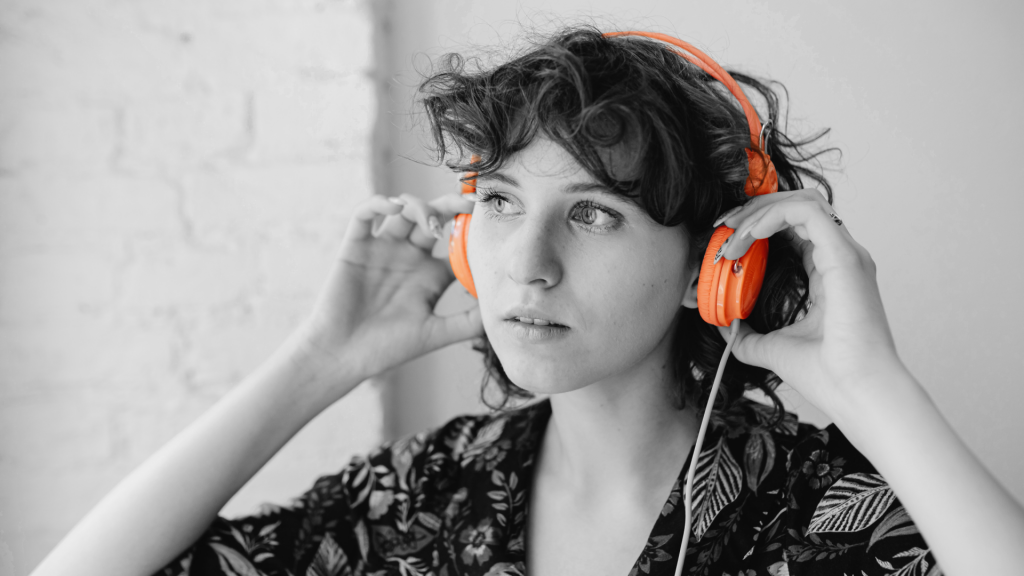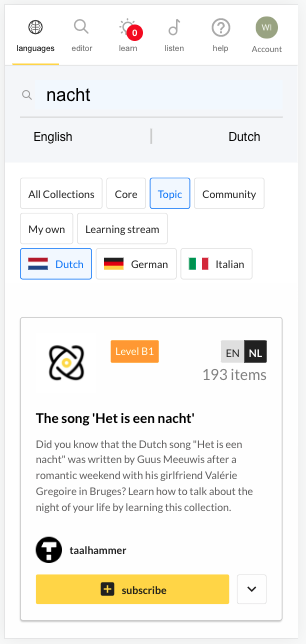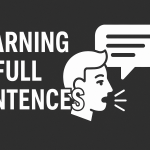I was once visiting Rotterdam with my friends and we went out on Friday evening. I had been studying Dutch for a few years back then, and I was able to speak it effortlessly with my online teacher, but I lacked courage to speak to native speakers, like the people on the streets. Little did I know that I will remember this evening when thinking about learning a language through songs.
This particular evening I decided to put my Dutch to the test in local bars. Alcohol is known to help you find courage and achieve fluency in a foreign language, so it seemed like a perfect opportunity!
If you have ever been to a Dutch bar, you probably know that these are mostly very small, crowded and loud places – the very definition of the famous Dutch word “gezelligheid”, which is a culture word that describes Dutch conviviality or sociability. A bar has a great vibe but is not the best place to practise a foreign language.
As the evening progressed, alcohol worked — I was able to regularly start conversations with strangers at the bar. The problem was, however, that I was not able to understand much beyond “Komt je hier vaak?” (Do you come here often?) or “Wat drink je?” (What do you drink?).
At some point the bar started playing the song “Het is een nacht” (“This is a night”) by Guus Meeuwis. I knew this song very well, as we analysed it in my very first Dutch course in Poland. It is a really good and catchy song. It also uses simple vocabulary so it is a good material for language learning. You can listen to it with lyrics through this link.
I am not sure if the song was still playing or not, when a girl standing next to me looked at me, smiled and shouted: “Heb je zin in een sigaret?” (Do you feel like having a cigarette?). Almost automatically I answered, “Je vraagt me of ik zin heb in een sigaret?” – which happened to be the first words of that song! We laughed, went outside the bar for a cigarette and had a great conversation in Dutch – about the song and all sorts of other things.
This evening always reminds me of two things: amazing things happen if you are learning a foreign language, and learning a language should be fun and exciting. People, especially in schools, forget about that and make it all about the grammar rules and completing exercises in their workbooks.
In this article I will tell you how to enjoy the process of learning a language and unlock your hidden talent at the same time.
You can listen to your favourite songs – it’s as simple as that!
Does music help with language acquisition?
Music is special. It can make us emotional even if we don’t understand the lyrics. Even infants respond to the rhythm and tempo, which would suggest that we are born with some sort of predisposition for music and rhythm.
But have you known that music and songs can make you a better language learner?
Well, it all comes back to this clichéd theory that it’s easier for children to take in a new language.
It finds its scientific grounds in the fact that as we age, the part of our brain responsible for reasonable thinking develops. Then we begin to analyse and question pretty much everything we are told. This is very detrimental to language learning!
Kids fully engage into every activity and never judge themselves. As a result, learning a language comes much more naturally and instinctively.
Anthony Lauder talks about this in his presentation “Why Is My Accent So Bad?” that he gave during the Polyglot Conference Polyglot Conference in Thessaloniki in 2016.
But don’t worry! When we listen to songs or music, the activity of the part in our brain blocking intuitive learning decreases and you start absorbing everything like a sponge. You can read about this in more detail in the article “Why are adults so bad at learning new languages? We may be trying too hard”.
It is almost like through music and songs you can unlock your talent to absorb language like a child.
The best way to learn a language with songs
The easiest way is probably just to memorise a song. Some songs are so short and catchy that you can memorise them without even understanding a word. This could be great if your only purpose is to sing it like a parrot! Otherwise it is just a waste of time. There is a much better way.
Songs give you so much more opportunity to learn some language. A song tells a story; you can learn not only words, but also phrases and sentences. That way you not only learn to sing it, but also how to tell a story in a compelling way. The music and rhythm help you automate the language, so you can develop linguistic reflexes that you can immediately use in a conversation.
Look at the beginning of the famous Dutch song Het is een nacht (That is a night):
Je vraagt of ik zin heb in een sigaret
Het is 2 uur ‘s nachts we liggen op bed
which can be interpreted as:
You ask me if I feel like having a cigarette
It is 2 o’clock at night and we are lying in bed.
The best way to learn a language with songs is to take words or phrases that are interesting and easy to remember, e.g.:
| Dutch | English |
|---|---|
| vragen of | to ask if |
| zin hebben in | to feel like |
| s’nachts | in the night |
| op bed liggen | to lie in bed |
Some are taken from the song but there are also new ones to expand your vocabulary even more. Then you can further grow your vocabulary by adding some related words that fit the story, e.g.:
| Dutch | English |
|---|---|
| het drankje | the drink |
| to lie on the floor | op de vloer liggen |
| in the morning | s’morgens |
Now you are ready to build sentences. Some are similar to the sentences from the song, but others can be variations like questions, negations, the past tense or the future tense.
| Dutch | English |
|---|---|
| Ze heeft zin in een sigaret. | She feels like having a cigarette. |
| Heb je zin in een drankje? | Do you feel like having a drink? |
| Ze vraagt of ik zin heb in een drankje. | She asks if I feel like having a cigarette? |
| Ze ligt niet op de vloer. | She doesn’t lie on the floor. |
| Gisteren lagen wij de hele dag op bed. | Yesterday we lay in bed all day. |
| s’morgens heb ik nooit zin in een sigaret. | In the morning I never feel like having a cigarette. |
You will be surprised how many phrases and sentences you can build from the whole song. Look at the list in the appendix at the end of this article.
When your list is ready, you have to memorise all the phrases and sentences. Memorising sentences is one the most efficient ways to learn a language. Your brain splits the sentences into chunks so later, during conversations, you can recall them as a whole or swap them to create novel sentences. It is a natural way of learning grammar without learning rules.
If you are interested in why learning a language with sentences is so efficient, we invite you to read our article “The best way to learn a language is through sentences.”

What are the benefits of learning a language through songs?
One of the pros is that you learn it all: grammar, vocabulary, idioms, phrasal verbs – you name it. You basically absorb it all like a sponge, especially when a song is catchy and you can’t get it out of your head.
Another great aspect is that learning through listening to music can help you with your pronunciation and accent. Every language has its specific rhythm, just like music, and combining the two has very positive results.
But the best thing about learning a language through songs is that it is so easy and effortless. Thanks to technology you can listen to music pretty much everywhere. Use that time to get acquainted with the lyrics, and then open the Taalhammer app and practise using our method.
If you are interested in more listening exercises, read our article on efficient listening exercises in language learning incl. the Shadowing Method, proposed by Alexander Argüelles, which we modified and translated in a digital version.
Where do I start learning a language with songs?
Now comes the best part. How about learning one of the most popular and well-known romantic ballads in Dutch?
Learning a new language by listening to songs goes really well with Taalhammer’s methods; it is extremely effective and fun.
To give you a head start, we have prepared for you the whole “Het is een nacht” song. We analysed it according to the principles described above and extracted a list of phrases and sentences. We also enhanced it with related vocabulary and grammatical aspects. We published it as a collection ready to learn.
Sign up to our app, and you will find it under topic collections.

Give it a go and see for yourself how great and fun learning a language with songs is. We also publish the first part of the song as the appendix to this article.
You will learn useful phrases, but since the vocabulary is not too advanced this is a perfect lesson for beginners as well as intermediate learners.
If you learn this way you will very soon effortlessly understand the song. But that’s not the end! You will be able to tell a story about having the night of your life, in Dutch, in a very natural way without mumbling. What a way to impress Dutch people in a bar!
Appendix: Het is een nacht
| Dutch | English |
|---|---|
| Je vraagt of ik zin heb in een sigaret ‘t is 2 uur ‘s nachts we liggen op bed In een hotel in een stad Waar niemand ons hoort Waar niemand ons kent En niemand ons stoort Op de vloer ligt een lege fles wijn En kledingstukken die van jou of mij kunnen zijn Een schemering De radio zacht En deze nacht heeft alles Wat ik van een nacht verwacht | You ask me if I feel like a cigarette It is 2 o’clock in the morning and we are lying in bed In a hotel in a city Where nobody hears us Where nobody knows us And nobody disturbs us On the floor there is an empty bottle of wine And clothes that could be yours or mine A twilight The soft radio And this night has everything That I expect from a night |
| zin hebben in | to feel like |
| de sigaret, de sigaretten | the cigarette, the cigarettes |
| het drankje | the drink |
| vragen, vroeg, gevraagd | ask, asked, asked |
| vragen of | to ask of |
| Heb je zin in een sigaret? | Do you feel like having a cigarette? |
| Ik heb geen zin in een drankje. | I don’t feel like having a drink. |
| Je vraagt of ik zin heb in een sigaret. | You are asking if I feel like having a cigarette. |
| Zij vroeg gisteren of ik zin had in een drankje. | She asked me yesterday if I felt like having a drink. |
| liggen, lag, gelegen | lie, lay, lain |
| op bed liggen | to lie on the bed |
| 2 uur s’nachts | 2 o’clock in the morning |
| Gisteren lagen wij de hele dag op bed. | Yesterday we were lying in bed all day. |
| Het is 2 uur s’nachts en we liggen op bed. | It is 2 o’clock in the morning and we are lying in bed. |
| in een hotel | in a hotel |
| in een stad | in a city |
| horen, hoorde, gehoord | hear, heard, heard |
| Wat heb je 2 uur’s nachts gehoord? | What did you hear at 2 o’clock in the morning? |
| Niemand hoort ons. | Nobody hears us. |
| waar niemand ons hoort. | where nobody hears us |
| Wij hoorden niets | We heard nothing |
| kennen, kennde, gekend | know, knew, known |
| Wie ken jij in deze stad? | Who do you know in this town? |
| waar niemand ons kent | where nobody knows us |
| Ken je iemand in deze stad? | Do you know anyone in this town? |
| Dit is een stad waar niemand ons kent. | This is a town where nobody knows us. |
| op de vloer liggen | to lie on the floor |
| een lege fles wijn | an empty bottle of wine |
| Heb je zin in een fles wijn? | Do you feel like having a bottle of wine? |
| Op de vloer ligt een lege fles wijn. | There is an empty bottle of wine on the floor. |
| Er lagen geen lege flessen wijn op het bed. | There were no empty bottles of wine on the bed. |
| storen, stoorde, gestoord | disturb, disturbed, disturbed |
| Niemand stoort ons. | Nobody is disturbing us. |
| Iemand stoort me. | Someone is disturbing me. |
| Stoort mijn sigaret je? | Is my cigarette disturbing you? |
| De lege flessen stoorden ons niet. | The empty bottles did not disturb us. |
| de stilte | the silence |
| het zwijgen | the silence |
| Het zwijgen stoorde me niet. | The silence didn’t disturb me. |
| de kledingstukken | the clothes |
| de kleding | the clothes |
| De kledingstukken zijn van mij. | The clothes are mine. |
| Zijn de kledingstukken van jou? | Are the clothes yours? |
| Kledingstukken die van jou of mij kunnen zijn. | Clothes that could be yours or mine. |
| de schemering | the twilight |
| de avond | the evening |
| Tijdens de schemering was het stilte. | At dusk there was silence. |
| Het is al avond. | It is already evening. |
| Het wordt donker. | It is getting dark. |
| naar muziek luisteren | to listen to music |
| zacht | soft |
| de zachte muziek | the soft music |
| de stemmingsmuziek | the mood music |
| de nacht | the night |
| vorige nacht | last night |
| De zachte muziek stoort me niet. | The soft music doesn’t disturb me. |
| Gisternacht hebben wij naar zachte muziek geluisterd. | Last night we listened to soft music. |
| Hoe laat is het donker geworden? | What time did it get dark? |
| Deze nacht heeft alles. | This night has everything. |
| Ik heb alles wat ik nodig heb. | I have everything I need. |
| We hebben geen zin in stemmingsmuziek. | We don’t like mood music. |
| verwachten, verwachtte, verwacht | expect, expected, expected |
| verwachten van | to expect from |
| Ik heb veel van je verwacht. | I have expected a lot from you. |
| Verwacht niet veel van die nacht! | Don’t expect much from that night! |
| Wat heb je van gisternacht verwacht? | What did you expect from last night? |
| wat ik van een nacht verwacht | what I expect from a night |







